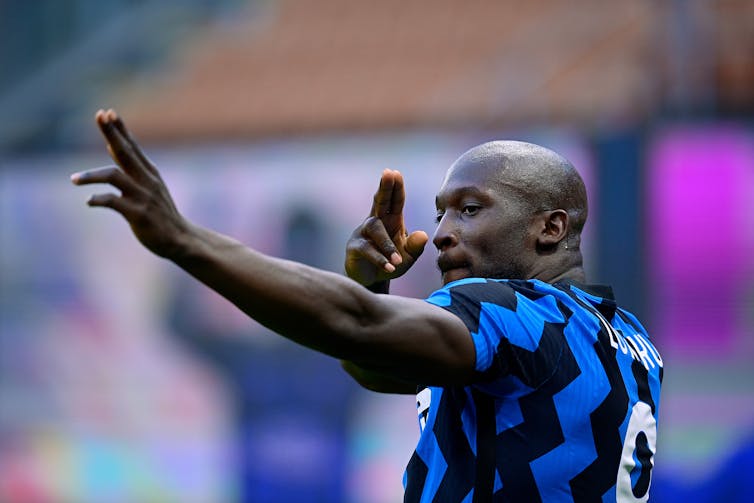
Wycliffe W. Njororai Simiyu, University of Texas at Tyler
The UEFA Euro 2020 football tournament – or the 2020 Union of European Football Associations Championship, held every four years – is scheduled to begin on 11 June 2021. The tournament was delayed by a year because of the COVID-19 pandemic. This edition was initially to be hosted by 12 cities in 12 countries in 2020. This is its 16th edition, celebrating 60 years since its inauguration in 1960. Portugal are the defending champions, having won the 2016 edition.
This tournament will be held as Europe grapples with social, economic and public health issues – among them Brexit, COVID-19, refugees, racism and immigration. One burning issue that is bound to be brought to life is that of race and racism. Since mid-2020, players in some leagues have been kneeling to signal their collective stance against racism. However, episodes of racial abuse for black players via social media are also on the increase.
Despite the rise in episodes of racial abuse and that of extremist viewpoints from politicians, European teams are increasingly becoming multi-racial as they reflect the population diversity of the nations.
So, players of different ancestries may become the focal point for discussions on race, nationalism and national identity in the countries they represent.
In a recent paper, I argue that for players of African descent representing European national football teams, Euro 2020 is a double-edged sword. It’s an opportunity to contribute to acceptance of multiculturalism in Europe especially when they win, but also a risk of being abused when they lose a match.
Nationalism and national pride
For hosting as well as participating nations, a mega event of this nature arouses feelings like national pride, identity and nationalism. Research indicates that previous similar football events – such as the FIFA World Cup – have shaped attitudes around national identity within the hosting countries.
However, the nationalistic attitudes have become more complex as European national teams have continued to diversify in terms of racial representation. Fewer European teams than in earlier years have only white players.
An event such as Euro 2020 can generate among viewers a shared experience allowing them to feel connected with the national football team and the nation in general. It is apparent that the extent to which the general citizenry of a country may feel connected with the national team and nation may differ for various ethnic audience groups as that connection is affected by several factors, one of which is one’s ancestry or ethnicity. For players of African descent, the sense of connection may be compromised by systematic inequality and frequent negative reception while on the field and in public discourses.
Migration of African players to Europe
The multi-racial teams that will be appearing in Euro 2020 have developed from the vast migration of sporting talent from Africa to Europe over many years.
European clubs and nations use their powerful economic position to dictate the terms on which they conduct the trade in football labour with African nations.
Because of the precarious financial situation of the game in Africa, clubs find themselves in a position of dependent trading. This facilitates the deskilling and underdevelopment of African football.
The loss of Africa’s most talented footballers to European leagues and, in some cases, national teams, can be viewed as ongoing post‐colonial exploitation. Ydnekatchew Tessema, president of the Confederation of African Football from 1972 to 1987, was a vociferous critic of the export of African players and once prophetically argued:
When the rich countries take away from us, also by naturalisation, our best elements, we should not expect any chivalrous behaviour on their part to help African football.
The double-edged sword
Analysis of the 2018 World Cup in Russia revealed a high presence of African (black and Arabic) players in top European teams. Of the four semi-finalist teams, only Croatia was 100% white, while France (63% white), Belgium (31% white) and England (37% white) had a high number of children of immigrants.
This increasing prominence of African players has both positive and negative consequences. On one hand, the quality of the national teams has improved and politicians and citizens take pride in their multicultural status. National teams seem to attract support across racial groups when the team wins. Minority groups feel more appreciated and included, which enhances their sense of belonging in their adopted countries. At a political level, there is a sense of national unity.
On the flip side, minority players also feel used and are racially abused when the team does poorly. According to one study French players of African descent face harsher criticism when the team does not do well.
In the words of Inter Milan star, born to Congolese parents, Romelu Lukaku:
When things were going well … they were calling me Romelu Lukaku, the Belgian striker. When things weren’t going well, they were calling me Romelu Lukaku, the Belgian striker of Congolese descent.
Lukaku’s is not an isolated case. In France, Zinedine Zidane, whose family came from Algeria, wasn’t truly viewed as French until he was photographed singing La Marseillaise – the national anthem – with tears in his eyes after leading the country to a world title in 1998.
Many naturalised black players face this particular dilemma. When they perform well, they are one of “them”, but when performance declines, they are “not one of us”.
Read more: Africa at the Football World Cup: 10 defining moments
The transnational nature of Euro 2020, in a globalised era and an anniversary year, presents an ideal moment to put into perspective the scramble for African footballing talent that will be on display – and to acknowledge the challenges that these players have overcome along the way.
Wycliffe W. Njororai Simiyu, Professor, Health and Kinesiology, University of Texas at Tyler
This article is republished from The Conversation under a Creative Commons license. Read the original article.

